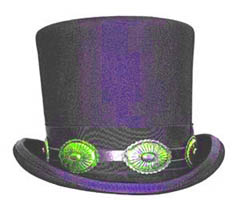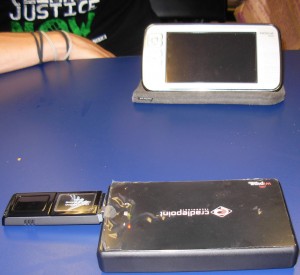An Analysis of Richard Wright’s Native Son, by Marc Frucht
Stanley Tookie Williams is dead.
Accused of murdering four people and having helped found the Crips streetgang, he was executed by the state of California. He maintained his innocence right up to the moment of his lethal injection at San Quentin prison.
While awaiting trial he became a Nobel Peace Prize nominee, children’s author and a vocal advocate against gang violence. Williams’ fate was sealed Monday afternoon, December 12, 2005 when California Gov. Arnold Schwarzenegger rejected a final appeal for clemency. The NAACP, ACLU and the Rev. Jesse Jackson all tried to speak on his behalf.
This all sounds like it could have been from a thrilling 1940s novel Richard Wright might write. But it’s all straight out of newspaper front pages in December 2005. Bigger Thomas was executed in Richard Wright’s book Native Son. The parallels are immense. There are far more similarities between these two cases than there are differences, to be sure.
Wright portrays Bigger’s attorney Boris A. Max, as a lawyer for the Labor Defenders and a Communist lawyer, willing to work for free. It’s arguable whether the modern day “labor defenders†ACLU have anything to do with communism really, but the other parallels are rather precise. Ramsey Clark, William Kunstler and others working pro bono for groups like National Lawyers Guild and the ACLU could easily be labeled ghosts of Boris Max. Max is readily labeled a communist because Labor Defenders as well as his personal friend Jan
Erlone are affiliated with communism. Although Max is well versed in Marxist analysis or communist issues in general it should be noted that throughout Wright’s book Max never once says yes, he is a communist. This depiction serves an ideal (and ironic) metaphor of America’s obsession with communism in its domestic and foreign policy in general, as well as a seemingly appropriate foreshadowing of the McCarthy witch trials which began shortly after Native Son was published. The book came out in 1940, and by the end of the ‘40s the McCarthy witch hunt was raging across the nation.
It would be helpful to note where race and class seem quite similar in both Wright’s book and throughout the U.S. in the ‘40s and ‘50s. State’s Attorney Buckley seems equally venomous as a racist and anticommunist, an easy and fairly accurate stereotype of most white Americans in the ‘50s and perhaps in some ways still to this day. It’s brilliant that Wright portrays Buckley as running for reelection throughout Bigger Thomas’ trial. Politics often keeps both racism and anticommunism institutionalized and embedded in every part of American culture.
One theme recurring through each part of Wright’s Native Son is that the American criminal justice system has never shown the equality and colorblindness that fans of its adversarial system at least profess. Court appointed attorneys still fall asleep in the middle of court cases, and statistics have shown that they do that more to people who are black and/or poor than the paid attorneys do to upper middle class whites. One of William Kunstler’s last research projects before passing away in 1995 was to tally up bonds bails and verdicts based on race. The statistics showed that bails and bonds were set much higher, and that the use of “flight risk†was used more frequently, for a black person than a white person.
Guilty verdicts and death sentences were given unevenly as well, and when rapes, murders, thefts, drug abuse, and more were charted as “black†and “non-black†rather than in some of the more traditional ways, the results supported Kunstler’s belief that Capital Punishment can never be fair in the U.S. until many daunting issues are overcome. Some of this research went into a larger body of work that led in 2003 to Illinois’ Republican Governor George Ryan’s granting blanket clemency to all 167 people on death row commuting their sentences to life without parole. Ryan had imposed a moratorium on the state’s death penalty in 2000 and asked for more research on the subject.
Bigger and Gus and the others planning out a robbery of Mr. Blum’s deli, although described in fiction, is a decent early account of day to day behavior of people in a street gang. Tookie Williams was accused of being a leader in the Crips street gang. There is only proof that he was affiliated with them. There is some evidence that he was a member. Insisting that he was a co-founder and a leader despite evidence to the contrary in a court of law seemed very similar in Wright’s book to the prosecution’s wheeling Bessie’s dead body into the courtroom on a gurney as evidence. The defense protests suggesting this evidence be excluded because it was meant solely to shock and outrage. These requests went unheard; once again showing the justice system as hostile toward the black and the poor.
Trying for an academic Marxian look at Bigger Thomas, you would see that he was looking for work. So issues of unemployment as well as poverty come up; and also that his mom raised him herself so he didn’t know his father well. No one in his family seems to be on an education track either. The struggle at the beginning of the book with his mom demanding that he kill a rat with an iron skillet shows that he was resisting and sometimes reluctantly buying into the idea of helping out as breadwinner in his family from the earliest times of adulthood.
Contrast Bigger’s life with that of Mary Dalton’s father, who owns the apartment complex where Bigger’s family rents. He occasionally hires Bigger, and donates millions of dollars to causes. He’s quite rich and clearly a willing recipient of what’s nowadays called “white privilege.â€
Attorney Max is a recipient of white privilege as well, but he seems to try harder to use his position to be a helpful person in other ways additional to, say, donating large amounts of cash. At one point in the court case Max has a soliloquy of sorts where he warns everyone that there will be more and more Biggers if we don’t resolve many of our nation’s shortcomings regarding crime, punishment, racism, and the like.
Max pleads that with every “atom of my being, I beg this in order that not only may this black boy live, but that we ourselves may not die!†(Wright 473). He wasn’t pushing for a full “not guilty†verdict; but he was begging mercy that Bigger receive a life sentence rather than that of death. While a life sentence only seems a tiny bit more dignified than death it could potentially keep someone alive long enough for someone to come forward with new evidence that might show them as not guilty or only guilty of a lesser charge. Many states where there is Capital Punishment afford many appeals and additional process with just that in mind.
He’s ineffective at getting Bigger acquitted or simply given life; but very astute and eloquent in observing the justice system’s shortcomings. Nearly prophetic. Those issues still rage on today.
Tookie Williams’ attorneys were equally unsuccessful at getting the death penalty removed from his court case. Now Williams himself got a word in almost as profound as (and parallel to) that of attorney Max.
“Don’t join a gang,” he used to say in speeches and in one of his books which he wrote from his San Quentin cell. “You won’t find what you’re looking for. All you will find is trouble, pain and sadness. I know. I did.” Ironically, Williams received a letter from U.S. President George W. Bush while he was still alive and writing from a jail cell commending him for his social activism. Even that couldn’t sway Governor Schwarzenegger to stay his execution.
Here is part of a mass mailing the NAACP sent out in the eleventh hour trying so hard to sway the California Governor.
Urgent Note from The NAACP:
Dear Friends:
Last Friday, I met with Stan Tookie Williams, reformed gang leader, Nobel Peace prize nominee, and acclaimed author, who is scheduled to be executed in the state of California at 12:01AM on Tuesday, December 13, 2005.
I left our meeting with the certainty that Mr. Williams offers more in life than in death and have committed the full support of the NAACP in his fight for
clemency.
Having exhausted his appeals, Governor Arnold Schwarzenegger is the only person who can grant Mr. Williams clemency. At this critical time, I am asking for your help by signing our petition in support of Stan Tookie Williams. Every petition makes a difference and I promise each one will be delivered to Governor Schwarzenegger. (savetookie.org)
Requests to spare Williams went just as unheard as those on Bigger Thomas’ behalf. Although little has changed since Wright wrote Native Son, a brief look at Wright’s life and times might further illuminate these parallels.
Wright’s legendary rise from poverty, growing up in the early twentieth century on a Mississippi plantation to becoming a successful author, would not at first seem like it prepared him for this book, until one looks over his struggles along the way. He was shuttled from relative to relative during his earliest years so he lacked steady role models. Some of his time growing up was spent in an orphanage and some was with just his grandmother and aunt, which didn’t exactly afford him positive male role models either.
At nineteen, Wright migrated to Chicago, “along with masses of other blacks who fled the racism, poverty, and lynch law of the rural South only to find the cities of the urban North, as he put it, ‘sprawling centers of steel and stone’ as cold and unyielding as the South†(Gates 1399). He left Jim Crow and after settling in had to face feeling like John Doe; perhaps a nameless faceless person of said steel and stone.
Now look at some of Native Son’s dialogue where Bigger’s attorney asks him to look out the window.
“See all those buildings, Bigger?†Max asked, placing an arm about Bigger’s shoulders. He spoke hurriedly, as though trying to mold a substance which was warm and pliable, but which might soon cool.
“Yeah, I see ‘em…â€
“You lived in one of them once, Bigger. They’re made out of steel and stone. But the steel and stone don’t hold ‘em together…†(Wright 498).
Wright is clearly speaking with a somewhat autobiographical tone in his observations both physical and metaphorical. He could’ve easily become a Bigger Thomas given different circumstances or times. He’s speaking of the infrastructure of American cities to be sure, but also about American peoples’ belief in the adversarial system of law. It works for many of us, to be sure, but not for Tookie Williams and not for Bigger Thomas.
Native Son earned Wright the reputation as a protest writer who “dared to expose the stresses and pathologies of the urban ghettos†(Gates 1400).
Throughout Native Son, Wright asks that the death penalty be replaced with life imprisonment; for Bigger Thomas, as well as for so many other people who will sit on or near “death row,†in fiction and in fact.
Had Tookie Williams’ case not originated in California, but Illinois (where Native Son took place, by the way) he might be alive today; but it wouldn’t have taken his defense attorney. It would have been commuted along with every other sentence in 2003 when Illinois Gov. George Ryan announced that he had commuted the sentences of all of the state’s death row inmates. “Our capital system is haunted,†said Ryan, “by the demon of error: error in determining guilt and error in determining who among the guilty deserves to die. What effect was race having? What effect was poverty having?â€
Ryan himself did not see himself as anti-death penalty by any stretch. He was a Republican “acknowledged during his speech that his actions would not be universally applauded. But he said he felt he had no choice but to strike a blow in ‘what is shaping up to be one of the great civil rights struggles of our time.’” (Flock)
Capital punishment in Illinois came under the microscope after a group of journalism students at Northwestern began looking into the case of Anthony Porter in the late 1990s.
The students, working with their professor and a private investigator, found evidence that cleared Porter after 17 years on death row. Ryan vowed he would do whatever it took to “prevent another Anthony Porter.”
Ultimately, 13 inmates who had been sentenced to death were exonerated, and Ryan declared a moratorium on executions in the state. (Flock)
Should other Governors respond in kind? They should at least read Richard Wright’s Native Son, before killing one more person. They shouldn’t have killed Bigger Thomas and we should not have killed Tookie Williams.
Until “we the people†confront issues of race and class in the honest and transparent ways necessary, there will be more Tookie Williams’ and there are sure to be more Bigger Thomas’s.
The crux taken up in this great work of naturalism can be summed up as the “consciousness of Bigger Thomas, and millions of others more or less like him, white and black, according to the weight of the pressure we have put upon them, from the quicksands upon which the foundations of our civilization rest” (Wright 402).
Works Cited.
Flock, Jeff ‘Blanket commutation’ empties Illinois death row. 11 Jan 2003. Online. 16 Apr 2008.
<http://www.cnn.com/2003/LAW/01/11/illinois.death.row>.
Gates Jr., Henry L., ed. Norton Anthology of African American Literature. NY: W.W. Norton & Co., 2004.
Mitchell, Hayley R., ed. Readings on Native Son. San Diego: Greenhaven Press, 2000.
savetookie.org, Save Tookie. Online. 16 Apr 2008.
<http://www.savetookie.org>.
Williams, Stanley. Gangs and the Abuse of Power: Tookie Speaks Out Against Gang Violence. New York: PowerKids Press, 1997.
Wright, Richard. Native Son. New York: Harper Collins, 1940.
Yaffe, David. Fascinating Rhythm: Reading Jazz in American Writing. Princeton: Princeton University Press, 2006.







